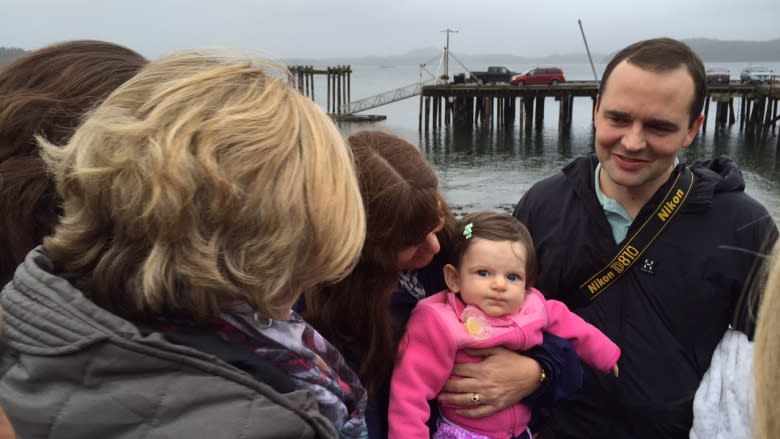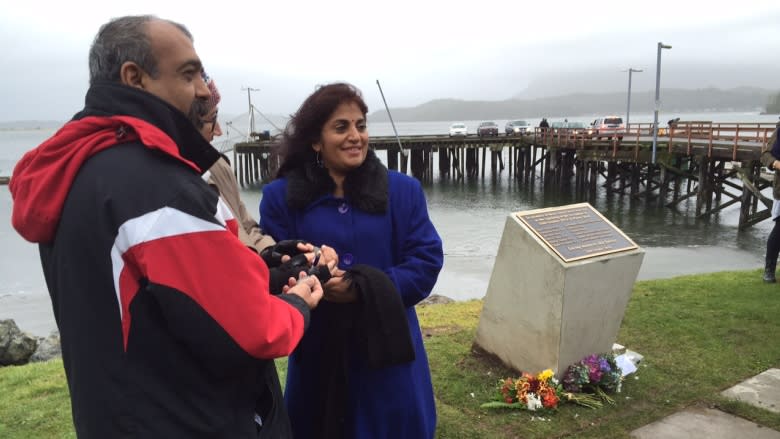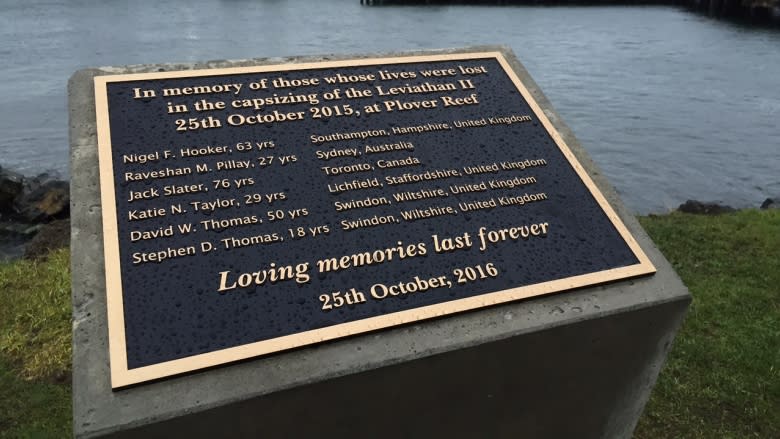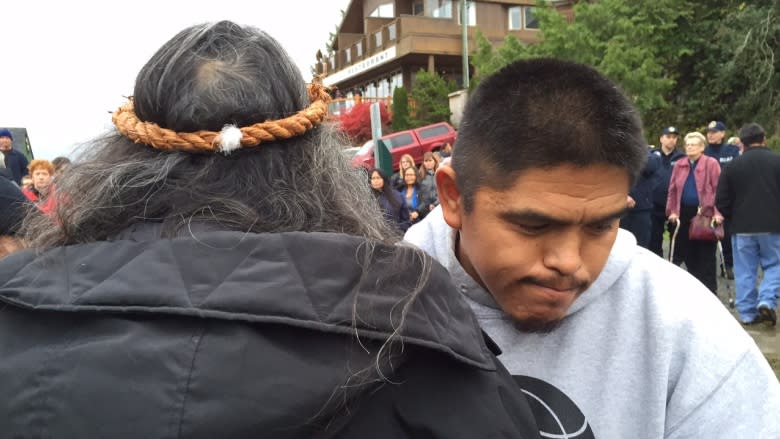Emotional ceremony marks anniversary of Tofino whale-watching tragedy
Passengers who survived after a whale-watching boat capsized near Tofino, and family members of those who did not make it, hugged and shared tears during an emotional ceremony on the anniversary of the tragedy.
A bronze plaque was dedicated at Tofino's main dock following a moment of silence. The names of the six victims were also read aloud.
Passengers who were saved after the Leviathan II suddenly capsized at nearby Plover Reef were brought to Tofino's main dock in a dramatic rescue effort carried out largely by fishermen and water taxi operators from the surrounding First Nations communities.
Mike and Judy Pillay travelled from Sydney, Australia, for the ceremony to mark the anniversary. They lost their son Raveshan Pillay, 27, in the accident.
"We are happy the community has done something like this for us," said Judy Pillay.
"We are overwhelmed with all the love and support we got from this community and we have come here to say thank you."
Through tears, Ian Charles also shared thanks. His wife Jill was pregnant last year when they were rescued from the frigid water. Their daughter Bridgette was born three months later.
"We are just really happy she is here with us," Charles said.
Tofino Mayor Josie Osborne said people were also reflecting on how the region came together to support survivors and first responders.
"It has, for many of us, been one of the most life-changing and difficult experiences that we have ever been through," she said.
"But the immediate response and the months that followed have also been very life-affirming."
Tourism not affected
The raw beauty of Tofino attracts tourists from around the world, and there were questions last year about how the accident would affect the town's economy.
But Osborne says Tofino saw an increase in tourist traffic of between 10 and 20 per cent this summer. Wildlife viewing and excursions, including whale watching, were also up.
"The wildlife viewing companies are very open and honest with their clients in discussing what happened and the changes that have been made," Osborne said.
"They know they are very well taken care of when they come to Tofino."
Part of the discussion tourism operators had this summer with tourists was about safety on the water, Osborne said, adding most companies reviewed safety and emergency response procedures in the wake of the accident.
Safety changes
Jamie's Whaling Station, the company that operated the Leviathan II, has also made changes.
Passengers were not wearing life jackets when the 20-metre vessel capsized. Transport Canada regulations do not require passengers to wear life vests on larger ships.
But Jamie's has since changed its own safety procedures and now requires all passengers on its boats to wear an inflatable personal flotation device, said Ryan Teremy, the visitor experiences manager.
"Our focus this year was on the comfort and safety of our passengers," he said.
Teremy said Jamie's did not experience a drop in business this year, but it was challenging to operate while staff recovered from the disaster.
The captain of the Leviathan II has yet to return to the water, he said.
"Understandably, he went through trauma there as well," Teremy said. "We are just doing everything we can to support him. He is still very much a part of the family."
All Leviathan II crew members are still employees of the company, he added.
Search and rescue
In the wake of the tragedy there were calls to better equip the local first responders who saved the lives of Leviathan II passengers.
But little action has been taken a year later, said NDP MP Gord Johns who tabled a bill in the House of Commons on Tuesday calling on the federal government provide training and equipment.
"In remote coastal communities, residents with local or traditional knowledge of the waters are often the first responders in crisis situations," Johns said in a statement.
The B.C. Government announced $50,000 in funding this summer to support emergency preparedness in Ahousaht.
Chief Coun. Greg Louie said meetings are also continuing with provincial officials on how to better integrate First Nations communities into the emergency response system on B.C.'s coast.
Negotiations around funding for First Nation's responders also continue with federal officials, he said.
The Transportation Safety Board of Canada also continues to investigate what caused the whale-watching boat to suddenly capsize. It's expected to release its findings next year.





